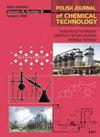Optimization of the biofuel production by idealized fermentation of the animal manure, chicken wastes, and sewage sludge
IF 1
4区 工程技术
Q4 CHEMISTRY, APPLIED
引用次数: 0
Abstract
This study aims to optimize an economic procedure to produce biogas and bio-ethanol from different organic wastes such as sewage sludge (SS) and/or cattle dung (CD) and/or poultry manure (PM). The experiment was carried out at a wastewater treatment plant in Egypt. Each waste type was mixed with the starter, CaCO通过理想化发酵畜禽粪便、鸡粪和污水污泥生产生物燃料的优化方案
本研究旨在优化利用不同有机废物(如污水污泥 (SS) 和/或牛粪 (CD) 和/或家禽粪便 (PM))生产沼气和生物乙醇的经济程序。实验在埃及的一家污水处理厂进行。每种废物都与启动剂、CaCO3 和水混合,然后装入发酵罐,在 35 °C 的厌氧消化条件下保持 35 天。每天测量沼气的蒸发量和甲烷 CH4 的含量,每四天检测一次纤维素酶和蛋白酶。结果表明,含有 SS 的消化器产生的沼气量(升)最大,为 27.45 升/天(升沼气/消化器/天),沼气含量为 0.61 升/天,第 16 天的累积沼气量为 606.30 升/天。第 17 天产生的甲烷体积百分比分别为 72.07%、71.16% 和 71.11%,而 SS、CD 和 PM 产生的生物乙醇酒精分别为 2.47%、2.32% 和 1.99%。该程序的效率突出表现在生物气体和原位活化酶的生产全部在一个反应器中进行,并定期监测其反应物和产品含量。无需对作为原料或化学添加剂的废物进行预处理,发酵后的残留物可进一步用于土壤施肥试验。这些废物有望用于生物能源生产,既经济又环保。
本文章由计算机程序翻译,如有差异,请以英文原文为准。
求助全文
约1分钟内获得全文
求助全文
来源期刊

Polish Journal of Chemical Technology
CHEMISTRY, APPLIED-ENGINEERING, CHEMICAL
CiteScore
1.70
自引率
10.00%
发文量
22
审稿时长
4.5 months
期刊介绍:
Polish Journal of Chemical Technology is a peer-reviewed, international journal devoted to fundamental and applied chemistry, as well as chemical engineering and biotechnology research. It has a very broad scope but favors interdisciplinary research that bring chemical technology together with other disciplines. All authors receive very fast and comprehensive peer-review. Additionally, every published article is promoted to researchers working in the same field.
 求助内容:
求助内容: 应助结果提醒方式:
应助结果提醒方式:


